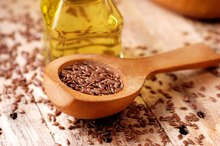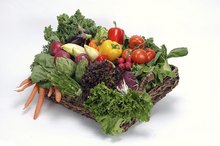What does fact checked mean?
At Healthfully, we strive to deliver objective content that is accurate and up-to-date. Our team periodically reviews articles in order to ensure content quality. The sources cited below consist of evidence from peer-reviewed journals, prominent medical organizations, academic associations, and government data.
The information contained on this site is for informational purposes only, and should not be used as a substitute for the advice of a professional health care provider. Please check with the appropriate physician regarding health questions and concerns. Although we strive to deliver accurate and up-to-date information, no guarantee to that effect is made.
Nightshade Vegetables & Skin Rash
If you develop a skin rash after eating nightshade vegetables such as potatoes, peppers or tomatoes, you most likely have an allergy to these vegetables. According to the Mayo Clinic, allergy to nightshade vegetables is uncommon 1. After eating nightshade vegetables, write down any adverse side effects you experience and make an appointment with your doctor. Common skin conditions associated with nightshade vegetables are contact dermatitis, eczema and hives.
If you are experiencing serious medical symptoms, seek emergency treatment immediately.
Allergic Reaction
During an allergic reaction, the body's immune system malfunctions, mistaking common foods or nontoxic substances as harmful. After eating or touching nightshade vegetables, your body overreacts to substances in the vegetables and begins developing antibodies to fight off the allergen, according to the Mayo Clinic 1. The presence of these antibodies causes other chemical reactions that lead to inflammation and irritation in soft tissue. Histamine is one chemical that soft tissues produce to help protect the body from harmful substances. Histamine causes inflammation and irritation when it is released throughout the body.
- During an allergic reaction, the body's immune system malfunctions, mistaking common foods or nontoxic substances as harmful.
- Histamine causes inflammation and irritation when it is released throughout the body.
Types
An Allergy to Mustard
Learn More
Three types of skin reactions can accompany nightshade vegetable allergy. Contact dermatitis is general inflammation and itching due to direct contact with a nightshade vegetable. Shortly after touching the vegetable, the skin becomes blotchy, inflamed and irritated in response to increased histamine in the skin. Hives may form in various shapes and sizes. Hives are flat on top and have defined borders. This type of skin rash can appear, disappear and reappear for no apparent reason. Hives are commonly safe unless they form in the ear or throat. If you have eczema, an allergic reaction to nightshade vegetables can cause a flare-up, according to the American Academy of Allergy, Asthma and Immunology.
- Three types of skin reactions can accompany nightshade vegetable allergy.
- Contact dermatitis is general inflammation and itching due to direct contact with a nightshade vegetable.
Considerations
If a food allergy is causing your skin rash, you may experience other food allergy symptoms as well 1. These symptoms include digestive issues, such as:
- nausea
- vomiting
- bloating
- diarrhea
- gas
- abdominal pain
Some people experience wheezing, coughing, chest tightness and shortness of breath. Nasal congestion, a runny nose, sneezing and eye irritation may also occur from an allergic reaction to nightshade vegetables.
Rash Treatment
A Skin Rash on the Hands and Ankles from a Food Allergy
Learn More
The American Academy of Allergy, Asthma and Immunology recommends using topical steroid creams to alleviate a skin rash that develops after contact with nightshade vegetables. You can use hydrocortisone for minor allergic skin conditions or ask your doctor for a prescription for corticosteroids if the rash is severe.
General Treatment
The Mayo Clinic recommends using an oral antihistamine to alleviate common allergy symptoms and skin rashes that may develop during an allergic reaction 1.
Related Articles
References
- Mayo Clinic: Food Allergy
- Silaste ML, Alfthan G, Aro A, Kesäniemi YA, Hörkkö S. Tomato juice decreases LDL cholesterol levels and increases LDL resistance to oxidation. Br J Nutr. 2007;98(6):1251-8. doi:10.1017/S0007114507787445
- Kaspar KL, Park JS, Brown CR, Mathison BD, Navarre DA, Chew BP. Pigmented potato consumption alters oxidative stress and inflammatory damage in men. J Nutr. 2011;141(1):108-11. doi:10.3945/jn.110.128074
- Arthritis Foundation. Best Vegetables for Arthritis.
- Bucheli P, Gao Q, Redgwell R, et al. Biomolecular and Clinical Aspects of Chinese Wolfberry. Herbal Medicine: Biomolecular and Clinical Aspects. 2nd edition. 2011. PMID: 22593925.
- Kaspar KL, Park JS, Brown CR, et al. Pigmented Potato Consumption Alters Oxidative Stress and Inflammatory Damage in Men. J Nutr. 2012 November 24;141(1):108-111. doi:10.3945/jn.110.128074.
- Silaste ML, Alfthan G, Aro, A, et al. Tomato Juice Decreases LDL Cholesterol Levels and Increases LDL Resistance to Oxidation. Br J Nutr. 2007 December;98(6):1251-1258. doi:10.1017/S0007114507787445.
Writer Bio
Diane Marks started her writing career in 2010 and has been in health care administration for more than 30 years. She holds a registered nurse license from Citizens General Hospital School of Nursing, a Bachelor of Arts in health care education from California University of Pennsylvania and a Master of Science in health administration from the University of Pittsburgh.









